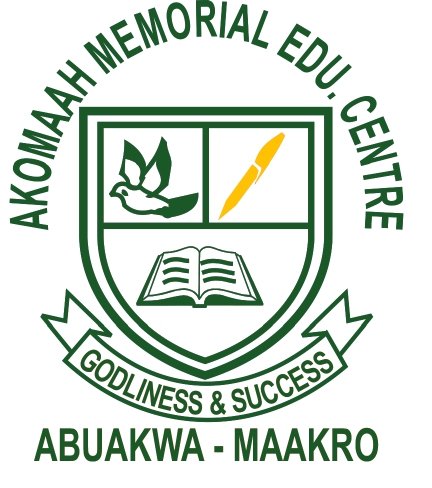Academics
The curriculum at Akomaah Memorial Educational Centre follows the guidelines set by the Ghana Education Service (G.E.S) and includes innovative elements to align with current global trends. Computer Studies is integrated to introduce our students to the challenges and opportunities of Information and Communication Technology (ICT).
Our Nursery program is designed to provide a gentle introduction to the world of learning. Here, children are encouraged to explore their surroundings, engage in sensory play, and develop their fine and gross motor skills. Our caring and experienced teachers create a warm and loving environment where each child feels valued and supported.
Key Features:
- Play-Based Learning: Activities are designed to stimulate curiosity and imagination.
- Language Development: Storytime, songs, and conversations to enhance vocabulary and communication skills.
- Motor Skills: Activities such as building blocks, puzzles, and outdoor play to develop coordination and strength.
- Social Interaction: Opportunities for children to play and interact with peers, fostering social skills and friendships.
Our Kindergarten program builds on the foundation laid in Nursery, preparing children for a smooth transition to primary school. The curriculum is a blend of structured learning and play, designed to develop academic skills while nurturing creativity and emotional growth.
Key Features:
- Literacy and Numeracy: Introduction to letters, sounds, numbers, and basic math concepts through engaging activities.
- Creative Arts: Opportunities for self-expression through art, music, and drama.
- Science and Exploration: Hands-on activities to introduce basic scientific concepts and foster a sense of wonder.
- Physical Education: Daily activities to promote physical health and coordination.
- Social Skills: Continued focus on cooperation, sharing, and developing empathy.
Our Primary School program builds on the foundation established in the early years, focusing on the development of core academic skills, creativity, and social responsibility. We provide a stimulating and supportive environment where students are encouraged to explore their interests and reach their full potential.
Key Features:
- Rigorous Academic Curriculum: Our curriculum covers a broad range of subjects, including Mathematics, English Language, Science, Social Studies, and Information Technology, ensuring a well-rounded education.
- Individualized Learning: We recognize that each child is unique, and we tailor our teaching methods to meet the diverse needs of our students.
- Interactive Learning: Through project-based learning, group work, and hands-on activities, we make learning engaging and meaningful.
- Character Education: We emphasize the importance of values such as integrity, respect, and responsibility, fostering strong moral character.
- Extracurricular Activities: A wide range of activities, including sports, music, art, and clubs, to support the development of well-rounded individuals.
Our Junior High School program is designed to prepare students for the challenges of secondary education and beyond. We focus on academic excellence, critical thinking, and leadership skills, ensuring our students are ready to excel in their future endeavors.
Key Features:
- Comprehensive Curriculum: Advanced courses in Mathematics, English, Science, Social Studies, and other subjects to ensure a strong academic foundation.
- Skill Development: Emphasis on critical thinking, problem-solving, and analytical skills, preparing students for higher education and future careers.
- Technology Integration: Incorporating modern technology and digital literacy into the curriculum to equip students with essential 21st-century skills.
- Leadership and Citizenship: Opportunities for students to take on leadership roles and participate in community service, fostering a sense of responsibility and civic duty.
- Guidance and Counseling: Support services to help students navigate academic challenges, personal development, and career planning.
Homework is very important in the academic work of the School. It is another means of evaluating the child’s work in class.
In the Lower Primary Department, homework is given daily and every pupil is expected to do the work before it is handed to the teacher the next day.
At the Upper primary and Junior High School Department, subject teachers give homework daily according to a timetable. Parents must ensure that their children do their homework before they hand them to the teachers on the due date.
Parents should check with the school if their child persistently says she/he has no homework. If a child is unable to do his/her homework, a letter from a parent should be submitted stating the reason.
